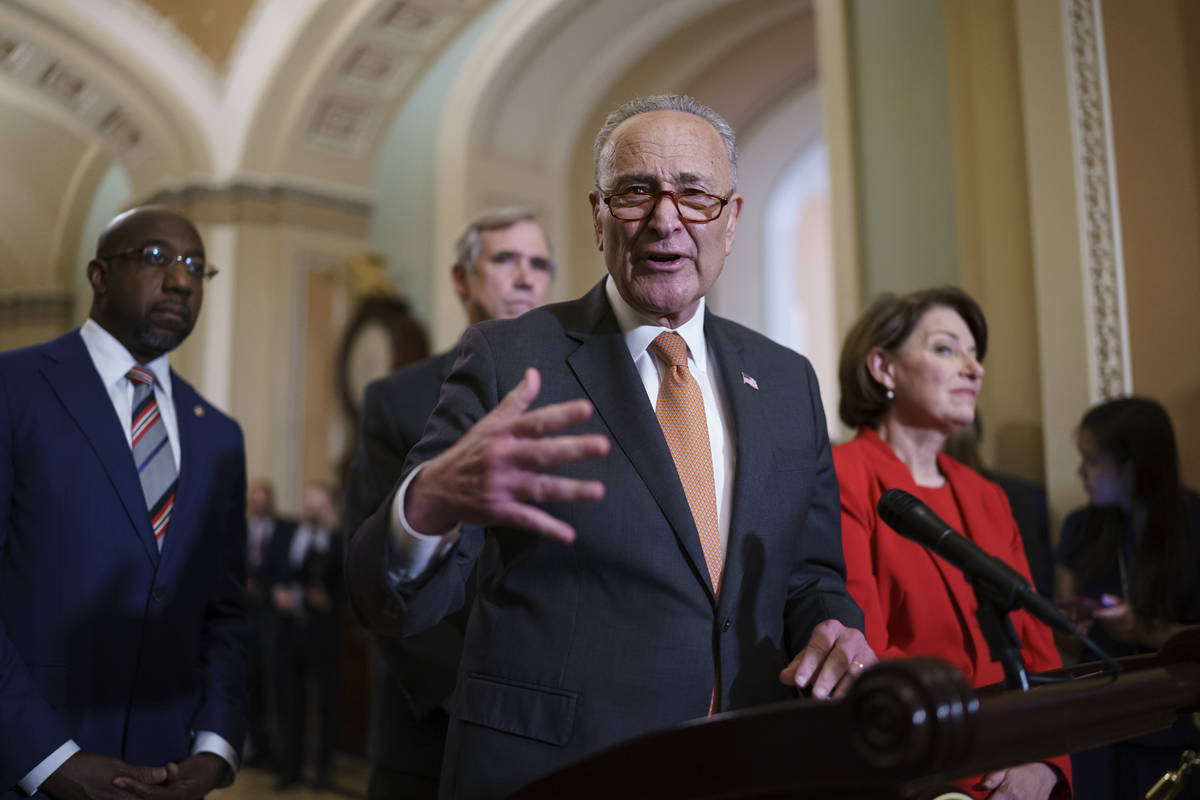GOP blocks Democratic voting rights bill in US Senate
WASHINGTON — A sweeping voting rights bill supported by Democrats was blocked Tuesday by Senate Republicans — setting up a battle as progressive lawmakers call for elimination of the legislative filibuster to end the minority party’s power to block bills.
The bill is the most comprehensive legislation in decades and considered a Democratic priority after Republican-led state legislatures have passed restrictive voting laws following the 2020 election that ousted Donald Trump and erased the GOP’s majority in the Senate.
The voting rights bill would make it easier to access polling places, extend voting hours and expand early and mail-in balloting that was used by many states during the pandemic.
Similar voting changes implemented in Nevada during the pandemic were codified by the Democratic-controlled state Legislature and signed into law by Gov. Steve Sisolak, a Democrat.
President Joe Biden has backed bills in the House and Senate to make it easier for citizens to vote. In a statement released by the White House Tuesday, he vowed to continue to push for the legislation.
“But let me be clear,” Biden’s statement reads. “This fight is far from over — far from over. I’ve been engaged in this work my whole career, and we are going to be ramping up our efforts to overcome again—for the people, for our very democracy.”
Democrats amplified that message in the Senate before the vote.
“About 400 bills have been introduced across the country this year to limit access to the ballot box,” Sen. Catherine Cortez Masto, D-Nev., said of GOP efforts. “We must stop these attacks on voting rights.”
Cortez Masto and Sen. Jacky Rosen, D-Nev., voted to begin debate on the Democrats’ voting rights bill after party leaders gained the support of their lone holdout Sen. Joe Manchin, D-W.V., who offered compromise measures but kept the bill largely intact.
The Senate voted 50-50 along strict party lines.
Partisan opposition
But the bill failed to reach the 60-vote threshold to overcome a Republican filibuster, which blocked it from coming to the floor for a vote on final passage.
Republicans claimed the bill would encourage ballot harvesting and make it easier to cast fraudulent ballots. Some also maintained it was inappropriate for the federal government to “take over” elections that are usually handled by states. (The U.S. Constitution, in Article I, Section 4, says Congress “may at any time by law make or alter such regulations” governing elections.)
The GOP opposition was partly fueled by Trump’s baseless claims that the presidential election was stolen.
Senate Minority Leader Mitch McConnell, R-Ky., led the GOP opposition against the legislation that he called a “partisan power grab” by Democrats in the 50-50 Senate.
The solid Republican opposition following Manchin’s proposed compromises on voter ID and paring back a public finance clause on elections did little to win bipartisan support that the West Virginia senator sought.
Senate Majority Leader Chuck Schumer, D-N.Y., said the fight continues. “We will keep fighting until we succeed,” he said.
Fighting the filibuster
The loss prompted progressives in the Senate to step up their calls to end the filibuster that allows the minority party to block legislation favored by the majority.
Ironically, it was McConnell and Republicans who eliminated the filibuster to push through three Supreme Court justices nominated by Trump over Democratic opposition.
But Senate Majority Leader Harry Reid, D-Nev., first deployed the “nuclear option” to eliminate the filibuster on judicial and administration nominees after McConnell and his GOP minority blocked President Barack Obama’s appointments.
Democrats are again citing Republican obstruction in blocking the voting bill and the formation of a Jan. 6 commission to investigate the insurrection at the Capitol to kill the filibuster.
The move to eliminate the filibuster has divided Democrats.
Rosen has said she would prefer a reform of the filibuster, but she noted that with some state voting practices under attack, “I will do everything in my power to protect this sacred right and our nation’s democratic values.”
In addition to a voting rights bill, elimination of the filibuster could clear the way for other legislation stalled in the Senate due to partisan gridlock, such as bills on infrastructure, gun control and others.
But many Democrats are wary of tossing away a practice that has allowed the minority party to stay relevant in the past several decades as the Senate has flipped between Republican and Democratic control.
With the Senate evenly divided, the 2022 midterm elections loom large in Democratic calculations. Biden, also, said he prefers reform of the filibuster rather than its elimination.
Cortez Masto echoed that. She called for a return to the “talking filibuster,” which would require a senator who wishes to filibuster a bill to speak and hold the floor to forestall voting.
“Nevadans expect their senators to work across the aisle and get things done,” Cortez Masto said in a statement.
Cortez Masto is up for reelection in 2022 in a “swing state.” She narrowly won her 2016 election 47 percent to 45 percent.
She came under fire Tuesday for her vote on the voting rights bill, known as S.1.
“Nevadans know that S.1 is nothing short of a federal takeover of our elections. Senator Catherine Cortez Masto must choose Nevadans over the far-left and reject this Democrat power grab,” said Keith Schipper, a Republican National Committee spokesman in Las Vegas.
Sam Brown, a Reno businessman and Army veteran, announced he will challenge Cortez Masto in 2022. Former Nevada Attorney General Adam Laxalt has also been touted by GOP leaders as a candidate.
Nationally, Democrats will be defending 14 Senate seats in 2022 while Republicans are trying to hold onto 20 seats.
Contact Gary Martin at gmartin@reviewjournal.com. Follow @garymartindc on Twitter.



















